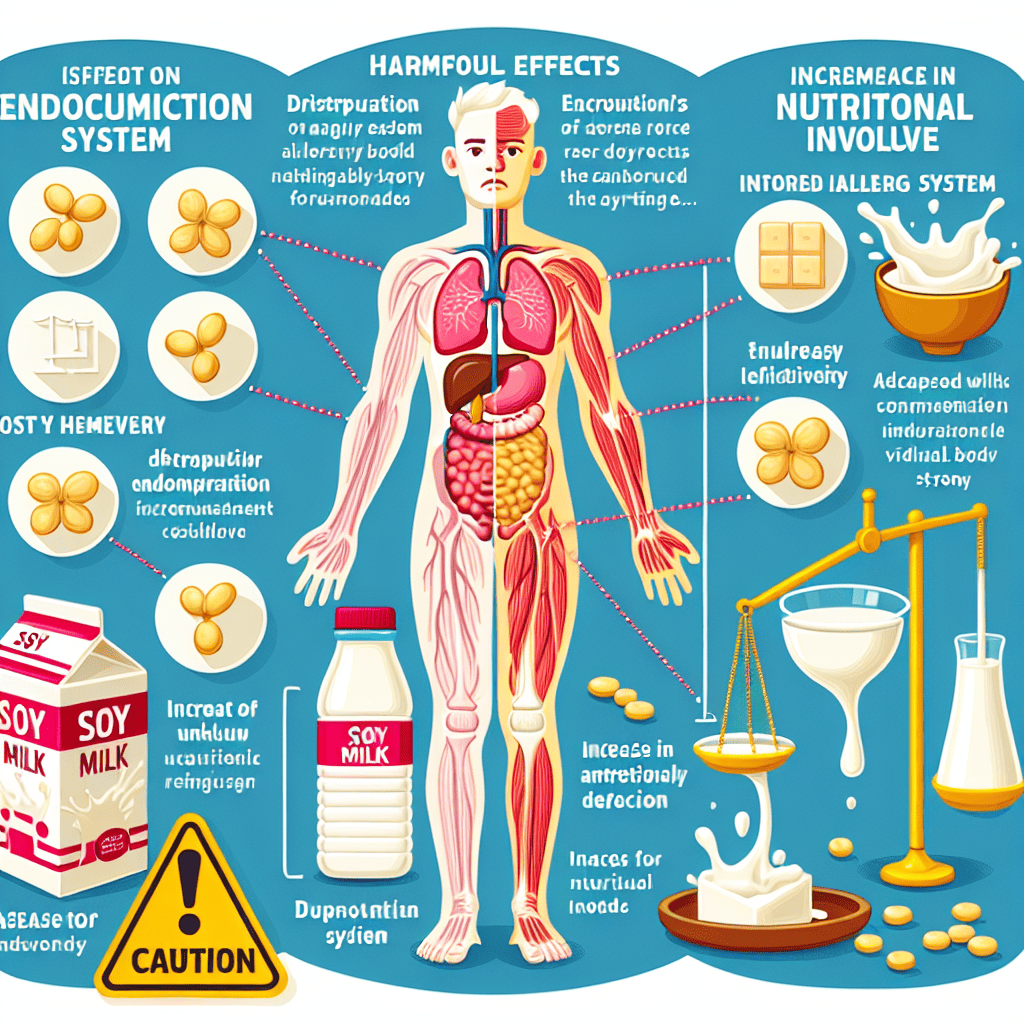Introduction: Soy milk has gained popularity as a dairy alternative, but it’s essential to be aware of its potential drawbacks. This blog post delves into the harms of soy milk, including its impact on health and well-being, addressing common concerns related to its consumption.
Table of Contents
- What are the Harms of Soy Milk?
- Does Soy Milk Cause Breast Cancer?
- Recommended Daily Consumption of Soy Milk
What are the Harms of Soy Milk?
Discover the adverse effects associated with soy milk consumption.
- May Cause Allergy:
Soy milk is a popular alternative to cow’s milk for individuals who are lactose intolerant or have a dairy allergy. However, for people with soybean allergies, consuming soy milk can be potentially dangerous. Allergic reactions to soy milk can vary in severity, from mild symptoms like hives, itching, or swelling to more severe reactions such as difficulty breathing, chest tightness, or even anaphylaxis, which is a life-threatening condition. Those who suspect they have a soybean allergy should consult with an allergist for proper testing and diagnosis.
It’s important for individuals with soybean allergies to carefully read food labels and ingredients lists to avoid accidentally consuming soy products like soy milk. Soy can be found in various processed foods and ingredients under different names, such as soy protein, soy lecithin, or hydrolyzed soy protein. Cross-contamination is also a concern, especially in facilities that process both soy and non-soy products. Therefore, individuals with soy allergies should be vigilant and proactive in asking about food preparation methods when dining out or purchasing food products.
In cases where individuals with soy allergies are looking for dairy-free alternatives to soy milk, there are a variety of plant-based milk options available, such as almond milk, oat milk, rice milk, or coconut milk. These alternatives can provide similar nutritional benefits without the risk of triggering allergic reactions in individuals with soybean allergies. Choosing soy-free alternatives can help individuals with soy allergies navigate their dietary restrictions while still enjoying a variety of milk substitutes to meet their needs and preferences.
- May Reduce Nutrient Absorption:
Antinutrients present in soy milk, such as phytic acid and lectins, can interfere with the absorption of essential nutrients in the body. These antinutrients can bind to minerals like iron, zinc, and calcium, making them less available for absorption. This can lead to deficiencies in these vital nutrients, affecting various bodily functions.
Moreover, antinutrients in soy milk can hinder the digestion of proteins and carbohydrates. Protease inhibitors found in soy can inhibit enzymes responsible for breaking down proteins, leading to incomplete digestion and potential nutrient malabsorption. Similarly, lectins in soy can interfere with carbohydrate digestion by disrupting the function of enzymes that break down carbohydrates into simpler sugars. This interference can result in gastrointestinal discomfort and reduced nutrient absorption.
The presence of antinutrients in soy milk can also impact overall nutrient intake. By hindering the absorption of essential nutrients and impairing the digestion of proteins and carbohydrates, antinutrients in soy milk can contribute to an overall decrease in the bioavailability of nutrients from the diet. It is essential to be mindful of these antinutrients and consider ways to mitigate their effects, such as through proper preparation techniques like soaking, fermenting, or cooking soy products to reduce antinutrient levels and increase nutrient absorption.
- May Interfere with Thyroid Medication:
Soy products contain compounds called isoflavones, which are known to have potential effects on the thyroid gland. Research has shown that isoflavones can interfere with the absorption of synthetic thyroid hormone medications such as levothyroxine, potentially reducing their effectiveness. This interference occurs because isoflavones can bind to the same proteins in the digestive system that are responsible for transporting thyroid hormones into the bloodstream. Therefore, individuals taking thyroid medications need to be cautious when consuming soy products because they might not be getting the full dose of their prescribed medication.
For those who rely on thyroid hormone replacement therapy to manage conditions such as hypothyroidism, the effects of soy on medication efficacy can be concerning. It is essential for individuals on thyroid medications to consult with their healthcare providers, particularly their prescribing physicians or endocrinologists, about their soy consumption. Healthcare professionals can provide personalized guidance based on the individual’s specific medication, dosage, and dietary habits. They may recommend adjusting the timing of medication administration in relation to soy consumption to minimize any potential interactions or suggest alternative dietary choices to ensure optimal medication absorption and effectiveness.
While soy products have many health benefits and are a common component of various diets, individuals taking thyroid medications should approach their consumption with caution. Balancing the benefits of soy with the potential risks of medication interference is crucial for maintaining thyroid health. Being proactive in discussing dietary habits and medication concerns with healthcare providers can help individuals on thyroid medications navigate the complexities of managing their condition effectively while enjoying a balanced diet that includes soy products.
- May Affect Male Fertility:
Soy milk has gained popularity as a dairy alternative due to its health benefits, including being a good source of protein and containing no cholesterol. However, some studies have raised concerns about its effects on male fertility. Research indicates that soy contains compounds called phytoestrogens, which are plant-derived chemicals that mimic the hormone estrogen in the body. High levels of estrogen-like compounds in the diet may potentially disrupt the hormonal balance in men, leading to a decrease in sperm count and quality. This has sparked discussions about the impact of soy milk consumption on male reproductive health.
While the evidence linking soy milk consumption to reduced sperm count in men is not conclusive, several studies have suggested a possible relationship between the two. One study published in the journal Human Reproduction found that men who consumed high levels of soy-based foods had lower sperm concentration compared to those who did not. Another study on rats showed that exposure to high doses of soy isoflavones, a type of phytoestrogen found in soy products, led to decreased sperm production. These findings have raised concerns about the potential effects of soy milk and other soy products on male fertility.
It is important to note that more research is needed to fully understand the impact of soy milk consumption on male fertility. While some studies have highlighted a potential link between soy products and reduced sperm count, other factors such as genetics, lifestyle, and overall diet can also play a significant role in male reproductive health. Individuals concerned about the effects of soy milk on fertility may consider moderating their consumption and speaking to a healthcare provider for personalized advice. Overall, maintaining a balanced diet and a healthy lifestyle are key factors in promoting optimal reproductive health for both men and women.
Does Soy Milk Cause Breast Cancer?
Addressing the misconception surrounding soy milk consumption and its alleged connection to breast cancer.
- Lack of Concrete Evidence:
Animal studies examining the relationship between soy consumption and breast cancer have yielded mixed results, with some suggesting a potential link while others showing no significant association. One of the primary concerns stems from the presence of phytoestrogens in soy products, such as genistein and daidzein, which have estrogen-like properties that could theoretically promote the growth of hormone-sensitive breast cancer cells. However, human metabolism of these compounds differs from that of animals, leading to varying responses. Additionally, the complexity of breast cancer, which includes various subtypes with different molecular characteristics, further complicates the issue. Some studies have even indicated a potential protective effect of soy consumption on breast cancer risk, especially when consumed early in life.
Despite the inconclusive nature of the data from animal studies, extensive research in humans has failed to establish a definitive link between soy consumption and an increased risk of breast cancer. Observational studies conducted in Asian populations, where soy consumption is traditionally high, have shown lower incidence rates of breast cancer compared to Western populations. Furthermore, clinical trials examining the effects of soy supplementation on breast tissue markers have not demonstrated consistent evidence of harm. In fact, some studies have suggested potential benefits, such as reduced inflammation and improved overall breast health, associated with soy consumption. It is essential to consider the overall dietary pattern and lifestyle factors in any assessment of the impact of soy on breast cancer risk.
Given the complexity of breast cancer development and progression, it is crucial to interpret data from animal studies with caution and prioritize human studies to draw more definitive conclusions. The investigation of soy and its potential effects on breast cancer risk is ongoing, with researchers focusing on clarifying the mechanisms through which soy components interact with breast tissue. As our understanding of breast cancer biology evolves, so too will our comprehension of the influence of dietary factors like soy. In the meantime, individuals concerned about their breast health should maintain a balanced diet rich in whole foods, including a variety of fruits, vegetables, whole grains, lean proteins, and healthy fats, while also staying physically active and avoiding excessive alcohol intake.
Recommended Daily Consumption of Soy Milk
Providing guidance on the appropriate daily intake of soy milk to avoid potential health risks.
- Moderation is Key:
Soy milk is a popular plant-based alternative to cow’s milk, as it is rich in protein, calcium, and other essential nutrients. It is also a good source of vitamins like B12 and D, making it a valuable addition to a balanced diet. However, consuming soy milk in moderation is important due to its potential health complications. Soy contains compounds called isoflavones, which are phytoestrogens that can mimic the hormone estrogen in the body. While some studies suggest that moderate consumption of soy may have health benefits such as reducing the risk of heart disease and certain cancers, excessive intake of soy can lead to hormonal imbalances and other health issues.
One of the key concerns with the excessive consumption of soy milk is its potential impact on thyroid function. Soy contains goitrogens, compounds that can interfere with the production of thyroid hormones. When consumed in large amounts, soy may contribute to hypothyroidism or worsen existing thyroid conditions. Additionally, some research indicates that high levels of soy consumption could be linked to disruptions in hormonal balance, fertility issues, and increased risk of certain cancers, particularly in individuals with a history of hormone-sensitive cancers. Therefore, it is essential for individuals, especially those with thyroid-related disorders or a predisposition to hormone-related conditions, to consume soy milk in moderation and consult with a healthcare provider if needed.
In conclusion, while soy milk offers numerous nutritional benefits, it is essential to be mindful of the quantity consumed to avoid potential health complications. Incorporating soy milk into a varied diet in appropriate portions can be a healthy choice for many individuals. However, excessive intake of soy products, including soy milk, may pose risks to certain populations, particularly those with specific health concerns. By balancing consumption and being aware of individual health factors, individuals can enjoy the benefits of soy milk while minimizing potential adverse effects on health.




